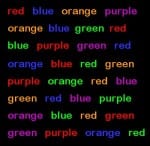Over the last two decades the use of hypnosis and post-hypnotic suggestion has move d from the realm of parapsychology into the mainstream of cognitive neuroscience research into consciousness. Former Wellcome Trust funded post-doc Ben Parris (University of Bournemouth) has developed a particular interest in how “cognitive control” mechanisms can be modified by post-hypnotic suggestion. The process of inducing an hyponotic suggestion in the lab involves reading out a simple script to volunteers who have consented to be hypnotised and have been identified to be susceptible to hypnosis through a pre-screening procedure.
d from the realm of parapsychology into the mainstream of cognitive neuroscience research into consciousness. Former Wellcome Trust funded post-doc Ben Parris (University of Bournemouth) has developed a particular interest in how “cognitive control” mechanisms can be modified by post-hypnotic suggestion. The process of inducing an hyponotic suggestion in the lab involves reading out a simple script to volunteers who have consented to be hypnotised and have been identified to be susceptible to hypnosis through a pre-screening procedure.
Our most recent paper together with Zoltan Dienes (Universityof Sussex), just published in the Journal of Experimental Psychology: Human Perception and Performance, examined how hypnotic suggestion affected performance in the Stroop task. In the classic Stroop task participants have to respond to the ink colour of a word which can be in conflict with the word itself e.g BLUE. Normally people respond more slowly when the word and colour are in conflict with each other, but previous studies have suggested that the effect can be abolished by implanting the suggestion that words are printed in incomprehensible characters from a foreign language (the “word  blindness” suggestion)(Raz et al. 2002).
blindness” suggestion)(Raz et al. 2002).
Ben was only partially able to replicate the original results and showed that it was only under certain conditions that the Stroop effect was abolished. Specifically when the stimuli were presented rapidly such that there was only 500ms between the last response and the next word being shown. Subjects who did not receive the word blindness suggestion still showed a strong Stroop effect even at the short response stimulus intervals.
The finding tells us about the level at which the hypnosis effect influences control over mental processes. In the case of the Stroop effect, word blindness is “activated” in a reactive way by the onset of a word and participants do not always exert sustained effort to maintain the word blindness suggestion. How post-hypnotic suggestions affect the brain’s perceptual and action control centres remains an ongoing question, but together with previous work, the new results offer some intriguing clues. They also confirm that hypnotic suggestion is a serious tool for the scientific study of mental processes and consciousness.
References/links
Parris BA, Dienes Z, Hodgson TL (2012) Temporal Constraints of the Word Blindess Posthypnotic Suggestion on Stroop Task Performance. Journal of Experimental Psychology: Human Perception and Performance. Advance online publication. http://psycnet.apa.org/psycinfo/2012-10032-001/
Raz A et al. (2002) Suggestion reduces the Stroop effect. Psychological Science, 17, 91-95.
OAKLEY, D. A. & HALLIGAN, P. W. (2009). Hypnotic suggestion and cognitive neuroscience. Trends in Cognitive Sciences, 13, 6, 264- 270 http://huuk.nfshost.com/